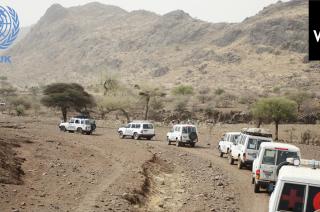When it comes to UNAMID, I saw their deployment in late 2007. The first 2-3 years were alright in terms of protection of some of the big IDP camps such as Abshouk and Zamzam, plus some of the villages. As time passed there were fewer liaison officers; the government of Sudan started to treat them as spies and started to put UNAMID forces under monitoring. This was the start of the deterioration. The reporting from UNAMID started to be infrequent and the protection factor reduced as the force itself was under attack by the government militias.
IM, a teacher from North Darfur
The UN Security Council is making a decision at the end of June to decide the future of the joint UN-African Union Mission in Darfur: UNAMID. A strategic review of the operation has suggested the phased reduction of troop numbers by 44%, and police numbers by 30%, over the course of a year. The new mission would be largely one of civilian peace-building and institutional support across much of Darfur, with a reduced military force concentrated on the volatile Jebel Marra area at the region’s centre.
UNA-UK and Waging Peace argue that significant care must be taken in drawing down the mission. The political, security, human rights, and humanitarian situations in Darfur are exceptionally precarious, and – given the recalcitrance of the Sudanese government – any reduction in the size or scope of the mission cannot be quickly reversed.
UNAMID undoubtedly has shortcomings, and in seeking to address these shortcomings it should also be possible to reduce overall troop numbers and make financial savings. Strong mission leadership and an improved selection process for the appointment of senior mission personnel would allow UNAMID to do more with less. Nevertheless, UNAMID provides a service of extraordinary value when it comes to preventing a return to all-out conflict, deterring human rights violations, and protecting civilians. These aspects of the mission must not be lost in a precipitous attempt to make savings. Not only would doing so come with a terrible human cost, it would also be a false economy.
UNA-UK and Waging Peace feel that the wishes and security concerns of Darfuris themselves should be key to discussions about UNAMID’s future. In this article, we have drawn from Waging Peace’s extensive network of contacts in the Darfuri diaspora, and in particular from in-depth interviews, conducted over the past two months, from across Darfur. Anonymised excerpts from four such interviews are presented here.
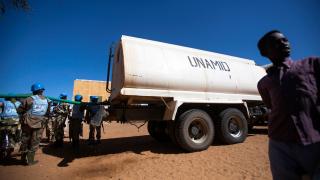
The overall context
Nonetheless, UNAMID’s presence was and is still regarded as a deterrent, and persons from the villages that live nearby still seek their help when they know an attack by the Janjaweed or government militia is imminent. They go to where UNAMID is residing and stay there until they feel it is safe to manoeuvre.
IM, a teacher from North Darfur
Women in Darfur will be one of the worst affected groups if UNAMID reduces troop numbers. I am a mother and I reside in Abu Shouk IDP camp. Women and young girls in here tend to go to the outskirts of the camp to collect wood for use as fuel. They face danger in form of rape and murder at the hands of pro-government militia: the Janjaweed, and the Rapid Speed Force. There should not be any plan to reduce the number of UNAMID troops; on the contrary, there should be an increase in number of the troops to protect civilians until a true peace is in place which would secure our return to our lands.
IA, from North Darfur
In 2015 the UN Security Council reiterated its position that any refinement of UNAMID should be based on progress made against three benchmarks:
- inclusive peace process through mediation between the Government and non-signatory armed movements on the basis of the Doha Document for Peace in Darfur
- protection of civilians and unhindered humanitarian access and the safety and security of humanitarian personnel
- prevention or mitigation of community conflict through mediation and, in conjunction with the United Nations country team, measures to address its root causes
Progress against these benchmarks has been minimal. The 2016 joint UN-African Union strategic review paints a picture of a security situation in Darfur which is an improvement on Darfur’s darkest days, but still highly volatile and increasingly fragmented. We would agree with that assessment, although we would suggest that the level of volatility is even higher than suggested. For instance, the conflict analysis and dynamics used in the strategic review are already out-of-date, as fresh violence erupted immediately after its publication. These clashes between government forces and a rebel group that the review had disregarded as an active presence in Darfur - the Sudan Liberation Movement - Minni Minnawi (SLM-MM) - were accompanied by revenge attacks on civilians.
The strategic review also notes that the political process of peacebuilding and reform is not progressing as rapidly as hoped and that "key provisions have yet to be implemented, and a number of outstanding issues related to the aftermath of the conflict and crucial grievances at the origin of the rebellion still need to be addressed". We would agree with this assessment, and further add that the political process is likely to be further slowed, and potentially derailed, as leverage over the Khartoum Government is lost, and bilateral partners fail to take advantage of opportunities to apply pressure.
Sudanese officials already adopt an adversarial attitude towards elements of the United Nations system, and recent appearances at the Security Council have only emboldened them. They will view UNAMID’s drawdown as a major success in their attempts to normalise relations with the international community, and will be further encouraged by the planned lifting of US sanctions in July. The only remaining points of leverage will then be removal from the US State Sponsors of Terrorism list and the resulting debt relief and financial investment this will bring. The US would do well to reward only spotless behaviour from Sudan’s Government in exchange, including against benchmarks relating to human rights and fundamental and political freedoms.
The strategic review mentions the humanitarian situation in Darfur, the protection challenges UNAMID faces, and “an adverse political and human rights climate”. Questions must be asked as to if these aspects have been given enough attention within the plan to drawdown the mission. In particular, for the peacebuilding element of the new mission to be successful then the wider UN system, the African Union, donor countries (notably the EU), and the wider international community need a comprehensive strategy for ‘post-peacekeeping’, which will require investing in human rights monitoring and reporting, supporting policing and the rule of law, and civilian training and humanitarian support. The UN country team has already indicated its incapability to deal with a large chunk of these programmes given its reliance on voluntary funding, so there is a danger that these elements will simply be abandoned if donors cannot be mobilised to compensate for UNAMID’s absence.
Because progress against the 2015 benchmarks is minimal, the strategic review suggests the revision of these and the selection of fresh indicators. This may help give the mission a greater relevancy and purpose, but it provides slim justification for refining the mission.
The consequence is that a drawdown of UNAMID would pose significant risks. We identify these risks as being primarily in the following areas: a lack of flexibility and thus a risk of a failure to perform the protection of civilians mandate, a failure to monitor and reliably report on observance of human rights, and a lack of ability to influence the wider humanitarian situation.
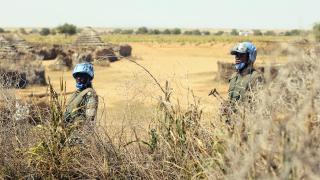
Flexibility
I am a teacher from El-Geneina. I have witnessed the effect of war on the youth over the years in west Darfur. This was particularly evident in the area after the Janjaweed took control of west Darfur. This also coincided with the withdrawal of the UNAMID forces. Therefore, reinstatement of the UMAMID troops in west Darfur will help reduce the loss of the lives.
Our area has been under the radar. Attacks on civilians, particularly in 2016 and 2017, have caused major havoc and atrocities partly because of the lack of monitoring, reporting and above all protection of civilians. The international community has to support the operation that will lead to reform of the force, and deploy more persons with better abilities in terms of protecting lives.
FB from West Darfur
I am from Basi, North East Kuguli, where the people of the region live under the terror of the Janjaweed. Eight months ago, the area went through major changes where new settlers were given native land by the local government. In 2012, the area was under constant attack by the pro-government militias. The refuge of the locals was where the troops of UNAMID were stationed. The presence of UNAMID does still represent a safety valve amid the dire security situation in Darfur. One has to mention that the number of UNAMID troops has visually reduced in the area and this did and does put the locals at danger and makes them easy prey for the pro-government militia.
NH, a carpenter from Basi in North Darfur
There remains a strong demand, highlighted in our testimony, for UNAMID to retain the protection of civilians as one of its primary priorities. This reflects the need identified to do so by the International Peace Institute (IPI), the Stimson Center, and Security Council Report joint paper, “Applying the HIPPO Recommendations to Darfur”.
The drawdown plan envisages corralling existing peacekeeping forces into the volatile Jebel Marra area, with protection of civilians elsewhere provided by “mobile quick-response capabilities”. However, our testimony reveals significant concerns surrounding protection from several parts of Darfur well outside Jebel Marra. Furthermore, the recent outbreak of fighting between pro-government militias and the SLM-MM rebel group, and corresponding civilian reprisals, have taken place not in Jebel Marra but in northern and eastern Darfur.
This demonstrates that UNAMID’s needs when it comes to protecting civilians will not be static and predictable. Nor can enhanced mobility be guaranteed to give the mission the flexibility it desires, particularly given the unlikelihood of UNAMID receiving significantly more helicopter lifting capacity. Further, the Government of Sudan has repeatedly demonstrated its ability to restrict the mission’s movement and so frustrate the mission in performing its protection mandate. It would have an even greater ability to thwart the rapid and flexible movement of peacekeepers around the region.
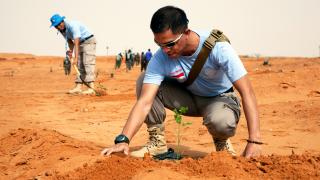
Human rights monitoring
When it comes to monitoring, reporting, and dissuading local-level human rights violations, UNAMID has a very poor record, as detailed in the International Refugee Rights Initiative’s report, "No one on the earth cares if we survive except God and sometimes UNAMID”. As that report states “it is clear that UNAMID has failed to use its presence to provide accurate and timely information about the situation on the ground. Its monitoring and reporting structures must urgently be improved.”
This is not just a UNAMID problem, but one of international engagement in Darfur more widely. Attempted cuts to the UN’s budgets for appointing human rights officers exacerbate issues and leave remaining personnel desperately stretched. In this context, the presence of UNAMID as the only body on the ground able to verify abuses means that when they fail to report, including at times to the Security Council, there is a complete policy and media vacuum.
As such, any attempt to improve the functioning of UNAMID as an effective tool for keeping peace should start with an attempt to increase and enhance the monitoring and reporting of human rights violations.
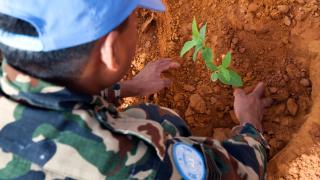
The humanitarian situation
The humanitarian situation is dire
NH, a carpenter from Basi in North Darfur
Humanitarian access is strongly stressed in the UNAMID benchmarks and the strategic review. Yet there is no plan for improving and enhancing access to humanitarian aid agencies, and no strategy for implementing the benchmark on ensuring the safety and security of humanitarian personnel. In fact, in a dramatic example of the personal danger faced by both troops and humanitarian staff, a Nigerian UNAMID peacekeeper was killed, the 64th in the mission to date, after the release of the strategic review. As the UN looks to transition from peacekeeping to building a sustainable peace, the ability to safely deliver programmes becomes even more important. Any UNAMID drawdown must be conditional on the establishment of full, unhindered, and protected humanitarian access.
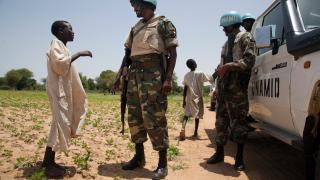
In conclusion – peacekeeping better
The issues of corruption, lack of capacity and the failure to protect itself and others on some occasions are not to be ignored. They need to be addressed and resolved. However, the bottom line is that the force can still manage to save some lives and protect some of the population from rape and torture, as well as report atrocities. As a teacher, I strongly sense that is the feeling among the parents and guardians of the pupils that I teach. The war is not over yet, one hopes that it will end sometime soon.
IM, a teacher from North Darfur
Peacekeeping is a strategy for deescalating conflicts. Deescalation necessitates a gradual reduction in the presence of military forces. It is neither feasible nor advisable for UN peacekeeping missions to maintain large contingents of troops in a conflict or post-conflict region indefinitely. It is therefore appropriate that the UN Security Council consider mechanisms for UNAMID to eventually render itself redundant.
However, for this to be successfully achieved, a sustainable and lasting peace must be built in Darfur. Extreme caution must therefore be exercised to ensure that the drawdown, occurring as it does during a time of volatility and with a newly emboldened but still largely unreformed Sudanese Government, does not upset progress toward such a peace.
This means that the new mission mandate must:
- have the ability to respond to threats to civilian lives across the region and retain protection of civilians as its first priority
- enhance human rights monitoring and reporting with respect to its current levels
- assure humanitarian access
Monitoring in particular is not a task which needs to be performed by armed personnel, civilian human rights officers could perform the same task provided enough are appointed and they are given the access and resources to do so. A drawdown does not have to be incompatible with any of these objectives, but it does require a strategy for ensuring that UNAMID’s future be guided by the needs and wishes of the people of Darfur.
Photos: UN Photo/Olivier Chassot/Albert González Farran

